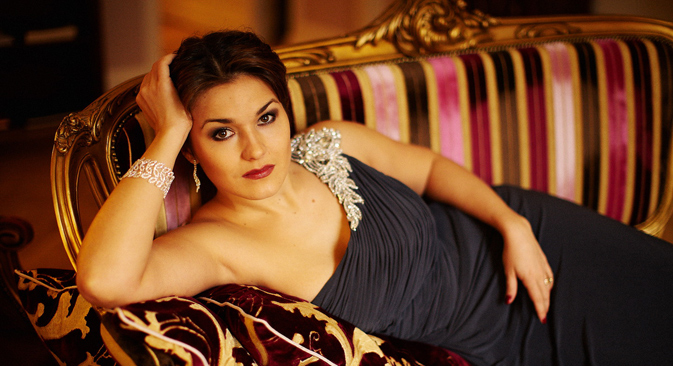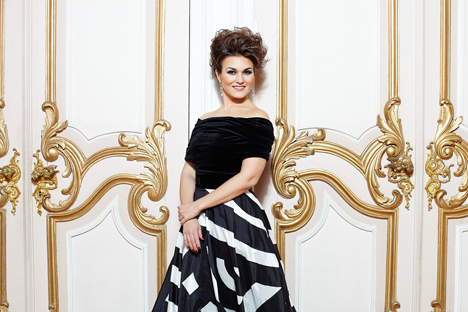A life on stage: The days and dreams of Russian soprano Olga Peretyatko

Olga Peretyatko. Source: Daniil Rabovsky/ olgaperetyatko.com
Did you dream of becoming a singer since you were a small child?
No! I dreamed of becoming a ballerina. We lived in St. Petersburg, not far from the famous Vaganova ballet school (the Vaganova Academy of Russian Ballet – RBTH). My father sang in the choir of the Mariinsky Theater, and they all knew each other, visited each other at home. I began to sing at the age of four, at family gatherings, standing on a chair. I always enjoyed performing for an audience. I still do.
Why did you decide to train as a conductor?
I entered the college under the conservatory when I was 15, which was a bit early for vocal training. But already then I knew that my life would be connected to music. The fundamental training I received in choral conducting, the basic music training, helps me a lot in my work. As do my piano skills, and the knowledge of the laws of harmony and a solid footing in solfeggio.
At the age of 21, you moved to Berlin. Did you find living abroad difficult?
The key thing is to become part of the European way of life. At first, it was very hard. I did not struggle with my German but I had arrived with practically no knowledge of it whatsoever. I entered the conservatory and enrolled in German classes. It was only after the first eight months that I began to feel more or less human again.
Then, you develop a certain enthusiasm. We invented various odd jobs for ourselves: We set up a quartet and gave little concerts in hospitals and hospices. We performed mainly Bach, Mozart, Handel – that which is easy to play.
I shall never forget: I had 10 euros a week to spend on food. That is, I didn’t have a spare 30 cents to buy a coffee from a machine. Experience like this teaches you a lot.

Olga Peretyatko. Source: Daniil Rabovsky/ olgaperetyatko.com
When did you have your first serious performances?
When I was studying in Berlin. My first serious director, my first serious project – a youth one of course – came in 2004, with Harry Kupfer. We performed Handel in German, only young singers. For two months, we had rehearsals in a castle not far from Berlin, and gave performances. I recently came across a DVD with a recording from that time and thought: “Dear God, I hope no one else will see this!” From the vocal point of view, it was just baby talk.
After three years at the conservatory, I decided that it was time to search for further programs. I realized that there was no point in sitting there for six years and I took part in a lot of auditions for opera studios, for different internship programs. Every theater has one, especially now, during a crisis: young singers, often very good, who cost very little. Thus theaters get good voices practically for free. Whereas we already had some money and stage experience.
Olga Peretyatko, Thomas Hampson & Rolando Villazón: Brindisi. Source: YouTube
I had a serious job at the Hamburg State Opera, where I sang for two years. In the summer of 2006, I attended Accademia Rossiniana in Pesaro, and in 2007, I performed Desdemona with Juan Diego Florez. Also in 2007, I sang the part of a flower maiden in Daniel Barenboim’s production of Parsifal. Between those two performances I took the night train to Paris to take part in Operalia and straight afterwards, literally on the next day, went to Pesaro. I was completely exhausted by then because a human body cannot operate under so much pressure for long. My body told me: enough. I think that I made my breakthrough at Pesaro. Since then I have been freelancing, so I am a free agent.
Would you like to be associated with one theater company?
No. If life gives you an opportunity to be a free bird, you should use it. When you sing in one theater company, you have to sing all the parts that you are given.
Schedule:
Oct. 20 – Nov. 19: Gilda in Rigoletto, Metropolitan Opera, New York (the schedule can also be checked on the Metropolitan Opera website)
Nov. 30 – Dec. 26: Gilda in Rigoletto, Teatro Real, Madrid
Dec. 31: opera gala, New Year’s Eve Concert, Shanghai
Jan. 8: Rossini program, concerts with Accademia Bizantina + Ottavio Dantone, Baden-Baden
Jan. 9: Rossini program, concerts with Accademia Bizantina + Ottavio Dantone, Paris
Jan. 15-31: Gilda in Rigoletto, Wien Staatsoper, Vienna
Feb. 29 – May 30: Opéra Bastille, Paris
Usually, singers go for this option at the end of their careers, when they are tired of traveling all over the world all the time. Or once they start a family and realize that it is no longer possible to move from one country to another every three days.
Are audiences in different countries in any way different?
Not particularly. In America, they like everything and are not very demanding. They are also very responsive, they laugh out loud, like in a cinema theater or at a Broadway musical; you almost get the feeling they may have brought their popcorn with them.
In Germany, the audiences are the most savvy of all: There are 80 theaters there, they have heard and seen everything, so it is hard to surprise them. In Austria, people are just very fond of music. In France, they have sophisticated tastes, they want to hear less known or rarely performed pieces… The French are very sophisticated listeners, true aesthetes.
You have already performed on the world’s main opera stages. Do you have any dreams left?
The main thing is to have good health. All the rest will come. As for dreams… I don’t have dreams, I have plans. My schedule is full till 2020. Although I do probably have one dream: I would like to do a joint project with an electronic band, like Air. I don’t yet know what we could do together, but I would like it very much.
Is competition in the opera world tough now?
It is tough everywhere. But I have found my door! (laughs)
More U.S.-Russia stories in your box!
All rights reserved by Rossiyskaya Gazeta.
Subscribe
to our newsletter!
Get the week's best stories straight to your inbox

-Alberto-Venzago-641.jpg)